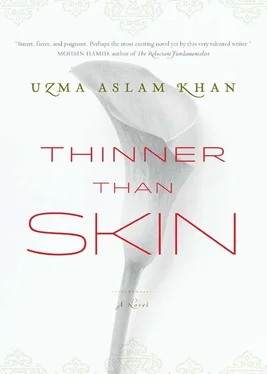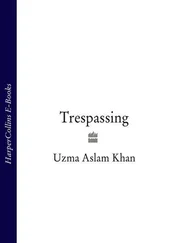She was coming out of a shack, with the girl.
“The woman knows a bitan who tells the future.”
“What’s a bitan?”
She was pleased to inform me a bitan was a “religious authority” who inhaled the smoke of burning juniper branches. “She also dances, to her own music.”
“What?”
“And drinks blood, from a goat’s head. Then she goes into a trance. Then she talks, with spirits. And fairies.”
I couldn’t tell if she was making fun of me. “You mean, like the fairy Badar Jamal?”
“I didn’t ask which.”
I wondered briefly what Farhana had smoked.
Behind me, Irfan and Wes were still on the trail, allowing us some privacy, though I could feel them wondering if the strategy was working. All of us were getting slammed hard by the rain, and it was ridiculous, the way we eagerly gave up pieces of our flesh to its teeth.
“Are you cold?” I said with absolute futility.
Wes jogged up to us. “Let’s check out the trail for tomorrow, then go back to the hotel.”
I nodded; Farhana wouldn’t move.
“Are we climbing in the morning or what?” said Wes.
“Not in the morning,” said Farhana.
“Jesus.” Wes wiped his wet beard. “Does anyone even remember why we came here?”
“Why don’t you remind us?” said Farhana.
Oh, this was pleasant.
“Hey, I was ready to head back, in Kaghan. After you guys,” Wes pointed, not at me but at her, “fucked up.”
It was possible I could begin to like him.
“People live here,” she said, all shaman-like. “We can’t ignore them. We’re not just here to take a few readings and photographs and be on our way.”
I had to turn my back to her to prevent myself from screaming.
Wes and Irfan decided to move away, giving us privacy again.
Leave it behind .
“You want to see the shaman?” I said, facing her again.
“Oh, I already did. And they’re called bitan .”
“Actually, in this valley, they’re called danyal.”
“Like our driver?”
“That’s right.”
We stared dumbly at each other. If we didn’t leave, we’d turn into a sacrifice — for the bloody rain.
“When?” I asked.
“When what?”
“When did you see the shaman?”
“You mean danyal.”
“When, Farhana?”
“She’d smoked already. Before I went to see her.”
“And what did she say?”
“She said we would … You know what? I don’t feel like saying. But I want to spend the day here.”
“We should scope out the trail for the morning.”
She shook her head.
“What?”
“We climb at night. When there are fewer landslides and icefalls. That’s partly what she said.” Her voice was quiet. “She also said you’re not to come.”
The rain and the wind were making me shiver.
“You know how many have lost their lives on this peak,” she added, soothingly.
“Did she say I was going to die?”
“No. Of course not.”
And then Farhana turned around and walked back into the shack.
Ahead of her, the girl and the goat skipped into the field.
Ahead of me rose Ultar Sar, a serrated finger of solid granite, the Hunza River snaking around its knuckle. This much I was already mapping in my head.
I spent my last day in Hunza wondering if it was my last day. I walked in the nearest town, Karimabad, from where Ultar was invisible. The sky had closed around us, a mountain range of rain inside a mountain range of gravel. At these heights, the battle between earth and sky was always won by sky; my visibility was limited to the images playing in my head.
Ultar had never captured my imagination the way Nanga Parbat always did. It wasn’t frequently photographed. Nor written up as deadly. Nor did it draw mountaineers from every corner of the world. It wasn’t one of the Tallest Ten. Standing at roughly 5,300 meters, it was almost 3,000 meters shorter than Nanga Parbat. It wasn’t a smooth ribald white from top to toe. Sexless, it had no lover.
Even so, that day I learned it did have a jinn. For whatever reason, this jinn stoked the appetite of the Japanese in particular, many of whom had attempted to summit Ultar, and many of whom had died. Years after his death, the valley still remembered Akihiko Ito, for he’d spoken to the people in their tongue, before setting out, in alpine style — as we would — without ropes, porters, or supplemental oxygen. And at night.
Of course, our plan wasn’t to summit. Ultar Glacier was not as high up as, say, Ghulkin Glacier, so we had no need for fancy expedition gear. And though I didn’t want to hear more, I couldn’t help myself. It was like staring at a drop while teetering at its edge. I had to look.
Ito had set out at midnight, expecting to summit before sunrise, before the rocks and ice could heat and shift. He’d succeeded in this. The problem occurred, as it so often does, on the descent. A storm engulfed him, he lost his way, he spent two days on a ledge without food. Even then he survived. It wasn’t till his return to basecamp that the jinn had entered Ito’s liver and, slowly, extinguished all his lights.
I had to pull myself away from the edge. I stopped asking for stories.
I ended up spending the day in a most unexpected way. I spent it with Wes.
I was walking up a dirt road through an orchard. Around me, baskets of apricots had been left to dry in the sun. As I walked, two women greeted me, each with two long braids and a cap. The older woman, her body spry, her face lined by a thousand landslides, offered me a soup made of dried apricots and qurut, a kind of cheese. When I politely refused, she laughed, pointing to the shade of a tree where Wes sat spooning the remains of his gift. “He is not shy,” she said. “You should be like him.”
But I was unable to accept any more generosity. “You are very kind,” I mumbled, increasing my pace.
He caught up with me. “These are your resources,” he said, “good, kind country folk.”
I thought, built any schools lately?
I said, “You have a strong stomach. Normally, one sip of the water here and even a brown man from the city is shitting liquid.”
“Nice.”
“No. It isn’t.”
“So that’s why you refused?”
“No. That’s not why I refused.”
To my left rose the silver fin of Rakaposhi, bright as a mirror, graciously illustrating the truth of her name: luminous wall. Some called her by an older name, Dumani, mother of mist. But she was free of clothing today. The rain had passed completely, the air was cool and clean, Rakaposhi dazzled after her bath, and I was at liberty with my camera. The longer I stayed in these valleys and the more photographs I took, the more I came to understand how each peak had to be seen apart from all others. Rakaposhi, despite her height, did not inspire dread in me the way the shorter Ultar peak had, earlier today. Nor did she turn her spire against the hearts of men, like Naked Mountain, or open her arms temptingly to us, like Queen of the Mountains, when Farhana and I had gazed upon her in the lake. Rakaposhi’s summit was elegant in its lines — razor-sharp, yes, but with a gentler grade — and it was no surprise that many insisted she was Pakistan’s most beautiful mountain. But this did not mean she hadn’t committed murder; the wild wolves who sheltered in her breast famously claimed her prey.
Wes leaned into my viewfinder. “Farrah’s right. Climbing’s better at night.” A thumbnail of yellow hair was sprouting beneath the green stripe that lay across his head. The green was fading to a pale copper hue, blending almost entirely with the rest.
“That’s how we climbed Mount Shasta. At night. With lights on our heads and drills to pull out the ice. She carried her own gear. Strong woman.”
Читать дальше












